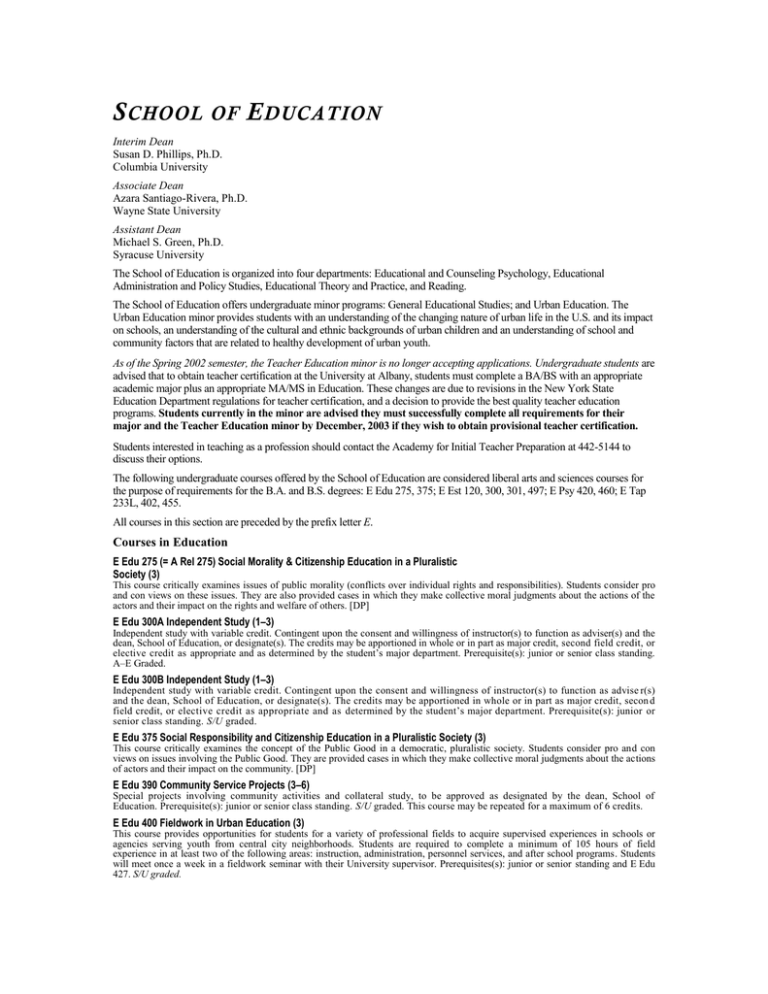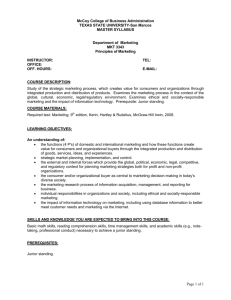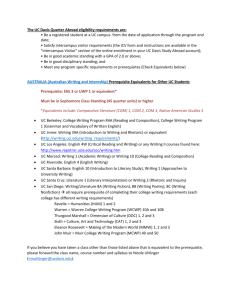S E CHOOL OF
advertisement

S CHOOL OF E DUCATION Interim Dean Susan D. Phillips, Ph.D. Columbia University Associate Dean Azara Santiago-Rivera, Ph.D. Wayne State University Assistant Dean Michael S. Green, Ph.D. Syracuse University The School of Education is organized into four departments: Educational and Counseling Psychology, Educational Administration and Policy Studies, Educational Theory and Practice, and Reading. The School of Education offers undergraduate minor programs: General Educational Studies; and Urban Education. The Urban Education minor provides students with an understanding of the changing nature of urban life in the U.S. and its impact on schools, an understanding of the cultural and ethnic backgrounds of urban children and an understanding of school and community factors that are related to healthy development of urban youth. As of the Spring 2002 semester, the Teacher Education minor is no longer accepting applications. Undergraduate students are advised that to obtain teacher certification at the University at Albany, students must complete a BA/BS with an appropriate academic major plus an appropriate MA/MS in Education. These changes are due to revisions in the New York State Education Department regulations for teacher certification, and a decision to provide the best quality teacher education programs. Students currently in the minor are advised they must successfully complete all requirements for their major and the Teacher Education minor by December, 2003 if they wish to obtain provisional teacher certification. Students interested in teaching as a profession should contact the Academy for Initial Teacher Preparation at 442-5144 to discuss their options. The following undergraduate courses offered by the School of Education are considered liberal arts and sciences courses for the purpose of requirements for the B.A. and B.S. degrees: E Edu 275, 375; E Est 120, 300, 301, 497; E Psy 420, 460; E Tap 233L, 402, 455. All courses in this section are preceded by the prefix letter E. Courses in Education E Edu 275 (= A Rel 275) Social Morality & Citizenship Education in a Pluralistic Society (3) This course critically examines issues of public morality (conflicts over individual rights and responsibilities). Students consider pro and con views on these issues. They are also provided cases in which they make collective moral judgments about the actions of the actors and their impact on the rights and welfare of others. [DP] E Edu 300A Independent Study (1–3) Independent study with variable credit. Contingent upon the consent and willingness of instructor(s) to function as adviser(s) and the dean, School of Education, or designate(s). The credits may be apportioned in whole or in part as major credit, second field credit, or elective credit as appropriate and as determined by the student’s major department. Prerequisite(s): junior or senior class standing. A–E Graded. E Edu 300B Independent Study (1–3) Independent study with variable credit. Contingent upon the consent and willingness of instructor(s) to function as advise r(s) and the dean, School of Education, or designate(s). The credits may be apportioned in whole or in part as major credit, secon d field credit, or elective credit as appropriate and as determined by the student’s major department. Prerequisite(s): junior or senior class standing. S/U graded. E Edu 375 Social Responsibility and Citizenship Education in a Pluralistic Society (3) This course critically examines the concept of the Public Good in a democratic, pluralistic society. Students consider pro and con views on issues involving the Public Good. They are provided cases in which they make collective moral judgments about the actions of actors and their impact on the community. [DP] E Edu 390 Community Service Projects (3–6) Special projects involving community activities and collateral study, to be approved as designated by the dean, School of Education. Prerequisite(s): junior or senior class standing. S/U graded. This course may be repeated for a maximum of 6 credits. E Edu 400 Fieldwork in Urban Education (3) This course provides opportunities for students for a variety of professional fields to acquire supervised experiences in schools or agencies serving youth from central city neighborhoods. Students are required to complete a minimum of 105 hours of field experience in at least two of the following areas: instruction, administration, personnel services, and after school programs. Students will meet once a week in a fieldwork seminar with their University supervisor. Prerequisites(s): junior or senior standing and E Edu 427. S/U graded. E Edu 401 Internship in Urban Education ((3) This course provides opportunities for undergraduate students in a variety of professional fields to acquire supervised internship in schools or agencies serving youth from central city neighborhoods. Students are required to complete 105 hours of organized internship experiences relevant to their academic interest and career goals. The internship is intended to utilize, refine and enhance the skills gained in the fieldwork component offered in E EDU 400. S/U graded. E Edu 402 Prevention and Care of Athletic Injuries (3) Accepted procedures in recognizing, preventing, and caring for common injuries—with laboratory experience. May not be taken for credit by students with credit for the former D Pec 402. E Edu 403 Advanced Athletic Training (3) A more in-depth continuation of the basic prevention and care of athletic injuries. The course presents a useful and scientifically accurate discussion of anatomy and physiology; the pathologic potential, and step-by-step description of the physical examination and assessment of athletic injuries. May not be taken for credit by students with credit for the former D Pec 403. Prerequisite(s): E Edu 402. E Edu 427 Issues in Urban Education (3) This course explores how social, political and economic conditions impact schools serving children and youth from inner city neighborhoods. Special attention is paid to individual, family, community assets and the development of school/community programs that enhance the academic strengths of urban children and youth. Students are involved in group investigations of local schools that serve urban youth from inner city neighborhoods. Prerequisite(s): junior or senior class standing. E Edu 440 “Teaching in Urban Schools: Strategies for Implementing the New York State Learning Standards” (3) An examination of effective instructional strategies for meeting the New York State Learning Standards in urban schools. The course will review the Learning Standards, demonstrate pertinent strategies that may be appropriate in urban schools and provide practical experiences in developing lesson plans. Subject area will vary E Edu 487 Institute in Education (1-3) Special course, not part of regular course offerings, designed to meet particular, nonrecurring needs. Courses in Educational and Social Thought E Est 120 Toleration (3) Interdisciplinary study of the theory, practice, and problems of tolerance. Stressing the historical origins of, the theoretical justifications for, and the sociopolitical conditions conducive to tolerance as well as those factors impeding it. May not be offered in 2003-2004. E Est 300 Social Foundations of Education (3) Inquiry into educational policies, purposes, and ideas based upon the resources and insights of the humanities and the social sciences. Only one of E Est 300 and E Est 301 may be taken for credit. Prerequisite(s): junior or senior class standing. E Est 301 Issues in American Education (3) Study of the structure and function of American education in the light of contemporary problems. Only one of E Est 300 and E Est 301 may be taken for credit. Prerequisite(s): junior or senior class standing. E Est 497 Independent Study in Educational and Social Thought (3–6) Independent reading, study, and research in educational and social thought. Prerequisite(s): junior or senior class standing and consent of department.

